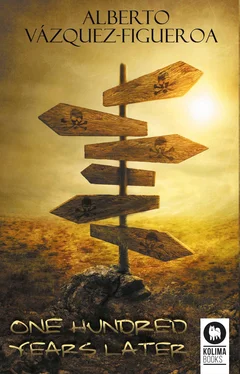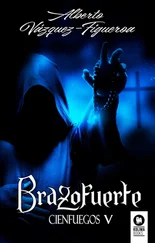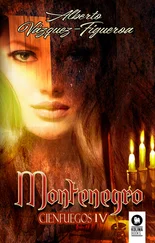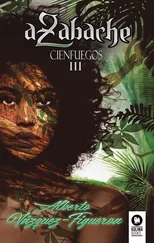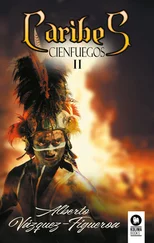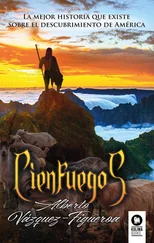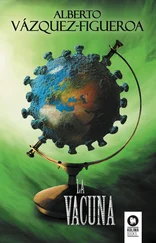“Yes, if we’re attacked. But, who’s attacking us? Until now it was tramps trying to force their way into the house, but today it was a woman. She was pregnant, for God’s sake!” She looked pleadingly at her daughter. “Don’t make me talk any longer.”
Aurelia respected her mother’s silence and returned to her task of mending her uncle’s work pants. She tried hard to push away from her mind the image of the woman who was taken down by a single shot.
Perhaps someone somewhere had shot her brother too, as he walked up to beg for food or water. Perhaps, but at that point nobody could tell for sure since the victims had gone from having a name to owning a number, until even that was taken from them and they became percentages.
It was like the times when her father had bet at the races. He would place the schedule on the table, arm himself with pencil and paper and argue with her mother about the likelihood of this or that animal reaching the finish line first.
“Takataka’s jockey is very good.”
“But this distance favors Ponycat.”
“He only pays three to one.”
“It’s not about trying to become rich with the horses; that’s what the cows and pigs are for.”
“Cows and pigs give us a living, but they will never make us rich–I would put twenty euros on Ponycat and five on Takataka.
A year had passed and winning no longer mattered, being last was better, now that the crown earned by the champion was the one reserved to the deceased.
For some time, florists’ businesses had boomed and each day was as profitable for their macabre enterprises as the Day of the Dead. Then came a time when even greenhouses were not enough to cover the demand and when there was not enough labor for the job.
And customers dwindled.
Not the deceased, naturally; their number went in crescendo. It was the living who were scarce, those who once bought flowers to pay homage to their loved ones were no more.
About a month before the television signal stopped reaching people’s homes, one of the channels had emitted a program in which a psychiatrist with an owlish face and a deep voice stated that the human brain was so complex that family members no longer viewed their dead as innocent victims, but as accomplices of the disease.
Where could Ponycat and Takataka be now?
They most likely had ended up in a roast, and the question of which had the tastiest meat probably never even crossed their owners’ minds.
One could imagine that taking half a second less to gallop one mile would not influence the meat’s flavor.
“What are you thinking?”
“I’m sewing, not thinking.”
“You can sew and think at the same time.”
“I prefer remembering things.”
“I’m your mother, I’m almost triple your age and have three times more memories than you do–my advice is that you stop thinking of times that will never return. It’s painful.”
“It’s also painful to watch bodies burn. I dream of them.”
“I would like to forbid you to dream, but that’s something only God may do.”
“You believe God can decide what I dream?”
“He can do anything.”
“In that case, why does he let the sick reach our gate making Dad and uncle Samuel intervene? Why doesn’t he stop those people before they try to get in? Or even better–why doesn’t he heal them?”
“Sometimes his ways are inscrutable.”
“That’s exactly what Father Luis, may he rest in peace, used to say, but I never really understood what he meant, and whenever I asked him about it he’d tell me to keep praying.”
“And that’s exactly what we must do.”
“Well, it doesn’t seem to be doing any good.”
“Don’t blaspheme.”
Aurelia did not think that saying the truth was a blasphemy, but resolved to keep on mending her uncle’s pants, knowing that her mother was holding onto faith even though the rest of the family did not share her beliefs.
Her father had been very strict about it:
“We’ve got enough problems as it is, we aren’t going to argue about religion. If it’s written that we must die before our time, we’ll do it with dignity and together, as what we’ve always valued the most, as a family.”
Her father had always been an honest man, but now he did not hesitate to shoot pregnant women.
Did that mean that he was no longer honest? Or did concepts change when circumstances did?
Her grandfather, who, thankfully, did not have to witness such apocalypse, would tell bitter stories about bloody wars in which beard-less boys became hateful slaughterers.
His grandchildren listened in silence because it was forbidden to talk while the patriarch was speaking, and there must have been some truth in his words for he was missing three fingers on one hand and had a deep scar traversing his forehead.
Mutilated in body and spirit, still he managed to get by, start a family and turn an abandoned wasteland into a fertile orchard.
He had gone against the trend and resisted rural exodus, perceiving that moving to the city was a mistake. He refused to become cheap labor, besides, he could only offer one hand.
The owner of what once constituted a prosperous estate that had become a desert after the draught, thanked Saint Pancracio for putting a poor devil in his path who would willingly give him all his savings in exchange for a handful of dirt.
However, when twelve years later he walked past the place again, he had to admit his blunder.
“I’d always felt a certain guilt because I believed I’d ripped you off. Now I see that it was me who got the worst part of the deal.”
“I never ripped you off, because the true value of all this isn’t in the money that I gave you, but all that time and work it took me to find the aquifer. Now people swear you won’t find better water than mine in the entire province.”
“Whoever’s got the good water will have the good life.” the old tenant replied. “I’m happy for you.”
The term “patriarch”, which has fallen in disuse these days, fit the grandfather like a glove. Now, the old man rested among apple trees a few feet away from the woman who had borne him three children–perhaps as compensation for the three fingers he had lost.
After a few adventures and diversions, the two eldest, Saúl and Samuel, followed their father’s steps, while the youngest, Anabel, insisted on studying Fine Arts and ended up as a restorer specialized in Flemish paintings.
Aurelia adored her aunt and was always impatient for summer, when Anabel appeared with a mountain of paintings to restore and an enormous accordion that horrified the whole family and made the dogs howl.
She had an eye for detail and a firm pulse but lacked an ear for music.
Aware of her limitations but deaf to discouragement, every morning and every evening she left the house and walked into the woods–where even squirrels scampered away–to play her music.
Funnily enough, her sister in law, who loved milking the cows, swore that whenever Anabel played, the cows gave more milk and farted less–details which she felt grateful for.
It was widely known that animals enjoyed music but not that cows had such bad taste; although, perhaps the fact that they spent their days ruminating made them more sensitive to certain nuances that the human ear could not perceive.
Aside from the disproportionate love for the accordion, which had earned her a handful of enemies among their neighbors, the offending musician was so chirpy and charming that her niece begged her parents to let Anabel sleep in her bed. Aurelia loved the hours she spent listening to stories about her aunt’s love affairs and the reasons why she had rejected five marriage proposals.
“The one I liked the most snored and the second on my list was Siberian.”
Читать дальше
